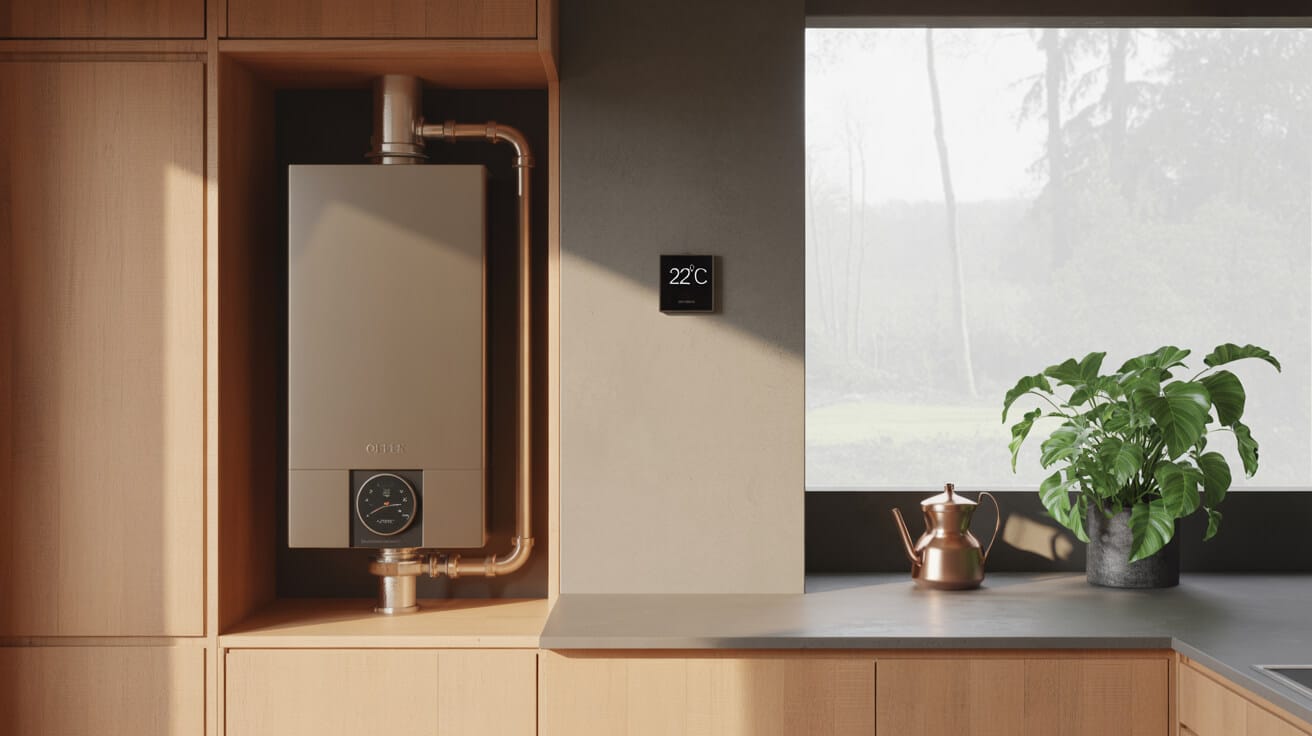Etymology or name origin
The acronym “Oftec” denotes the Oil Firing Technical Association, formed in the early 1990s to address industry fragmentation and elevate competency in oil heating installation and support. Linguistically, the term encapsulates the role of technical standardisation in oil-based heating, with associated concepts such as “competent person scheme,” “certified installer,” and “accredited business” all referencing aspects of compliance central to sector best practice. The evolution of these terms reflects growing social and regulatory emphasis on safety, pollution mitigation, and consumer assurance in heating services.
Overview / context
Oil-fired heating retains strategic significance in properties distant from gas mains, including rural homes, agricultural holdings, and specialist commercial premises. The prevalence of these systems correlates with patterns of energy infrastructure and geographic isolation, powering essential heat and hot water where alternatives may be impractical or uneconomical. Oftec registration, demanded by policies and preferred by insurers, provides your property with demonstrable safety, efficiency, and documentation robustness.
Companies such as Plumbers 4U align registration credentials with rigorous company vetting, technical infrastructure, and customer-facing transparency. For property owners, landlords, and portfolio managers, engaging registered firms minimises the risk of fire, pollution, and warranty invalidation, supporting both immediate reliability and long-term regulatory readiness.
Plumbing and heating industry context
Within the plumbing and heating sector, oil-fired systems represent a technology niche governed by strict design, operational, and service protocols. The Oftec regime brings parity to oil heating, ensuring you benefit from standards comparable to those covering gas (Gas Safe Register) and renewables (MCS). Regulatory instruments mandate that new systems, upgrades, or significant repairs on oil combis, system boilers, or bulk fuel storage be executed by Oftec-compliant professionals, minimising your risk exposure and supporting ongoing system performance.
Prevalence of oil heating
Approximately 1.5 million UK properties rely on oil-fired heating, representing both a significant market share and a concentration of technical challenge. Rural communities, off-grid business sites, and certain institutional or public sector buildings form the backbone of the installed base. For these assets, Oftec registration acts as a bulwark against non-compliance penalties, system inefficiency, or adverse environmental events.
Consumer protection rationale
Oil heating presents unique hazards—pressurised fuel lines, volatile storage, and combustion venting. The Oftec registration process directly addresses these risks by mandating not only technical training and assessment but also continued learning adapted to evolving regulation and technology. Policy frameworks frequently cite registration status as a precondition for council permissions, grant eligibility, and valid insurance settlements.
History
Origins and early adoption
The oil heating sector in the late twentieth century encountered significant variability in installation standards, with consumer incidents and environmental losses exacerbated by low entry barriers and inconsistent oversight. The Oil Firing Technical Association arose to unify disparate practices and formalise technical pathways for practitioners, rapidly gaining government endorsement.
Industrial and regulatory evolution
Throughout the 1990s and 2000s, Oftec’s scheme absorbed successive waves of policy reform, becoming a statutory basis for competent person self-certification. Successive policy statements positioned Oftec alongside the emerging Gas Safe Register in regulating competent heating system conduct. For your company or organisation, this marked a pivot: system commissioning, major modifications, and compliance documentation now required traceable, certified expertise, safeguarding you against third-party or client liability.
Integration into building regulations
By the mid-2000s, Oftec registration was codified in Approved Document J of the Building Regulations, elevating documentation (commissioning certificates, maintenance records) to regulatory status. As sector innovation matured—introducing Condensing Boilers, hybrid systems, and remote monitoring—registration requirements were incrementally strengthened, embedding operational quality in your entire service and asset lifecycle.

Concept and system description
Oftec registration amalgamates technical skill, ethical conduct, and process discipline, providing multi-level assurance for system owners, regulatory bodies, and the broader community. The regime codifies both company-level and individual practitioner responsibility, binding your compliance to both legal and technical standards.
System components
Oil heating systems consist of:
- Boilers: Regular, system, or combi units, configured for site-specific heat and hot water loads.
- Storage tanks: Above or below ground; bunded for containment and spill protection; size and siting according to DEFRA/EA standards.
- Burners: Atomizing or vaporising units with safety shut-off and monitoring.
- Fuel delivery lines: Pressure-rated, insulated, and isolated with mandatory fire valves.
- Controls: Programmable, thermostatic, or internet-enabled, with fault signalling and fuel management options.
- Flues: Rigid or flexible, externally terminated with certified draught management.
- Safety/monitoring hardware: Leak detection, tank monitors, CO/alarm systems.
Each component falls under separate audit protocols, with manufacturers commonly requiring Oftec registration as part of warranty validation.
Engineering and safety principles
To maintain Oftec registration, your engineer or company adheres to:
- System design: Site and property suitability, zoning, capacity, compatibility with existing infrastructure.
- Combustion analysis: Air-to-fuel ratios, emission metrics, power efficiency benchmarks.
- Fuel management: Secure storage, secondary containment, periodic testing for microbial or water contamination.
- Fire/environmental risk controls: Engineered separation distances, spill response planning, explicit tank foundations.
- Documentation: Comprehensive records for each design, instal, or repair episode.
Compatibility with renewables and hybrids
Oftec’s protocols accommodate integration with air/ground-source heat pumps, solar thermal, and emerging biofuel blends. Registered providers must demonstrate awareness of system integrity and cross-compatibility, ensuring your organisation remains eligible for future energy or compliance incentives.
Registration process
Eligibility and application
You may only receive Oftec registration by satisfying both qualification and conduct requirements. Company applicants submit proof of professional insurance, liability cover, and technical staff holding Oftec-compliant credentials. Sole traders and technicians must document practical experience, formal technical training, and ongoing CPD.
Training pathways and accreditation
Core training covers:
- System design and sizing:
- Equipment selection and installation:
- Combustion and efficiency assessment:
- Environmental compliance:
- Legal/safety protocols:
Examinations include both written and practical modules, with direct observation on test rigs or live system scenarios. Plumbers 4U, for example, invests in ongoing, manufacturer-partnered accreditation to keep your service ahead of legislative change.
Maintaining registration and CPD
Oftec registration is contingent on regular assessment, typically on a five-year cycle. This includes:
- Record of completed works:
- CPD credits (seminars, technical updates, manufacturer days):
- Formal reassessment and technical re-evaluation:
Failure to maintain these standards results in deregistration and removal from public listings, affecting your company’s right to operate or market itself as compliant.
Public register and verification
The Oftec public register is accessible to any consumer or facility manager, enabling instant verification of a provider’s credentials. Insurers, compliance officers, and procurement teams increasingly demand this verification as a precondition for contract, claim, or remedial approval.
Applications and stakeholder roles
Domestic properties
In rural and off-grid environments, homeowners leverage Oftec registration to assure installation integrity, lower insurance premiums, and minimise disruption when transferring property title. Your use of registered trades protects against both technical failure and litigation risk in the event of accident, spillage, or injury.
Landlord and letting use
For landlords and managing agents, registration reflects duty-of-care compliance, smoother claims under rental or warranty cover, and alignment with local licencing requirements. annual servicing, commissioning, and emission checks are typically specified in your property or tenancy documentation, validating the installed system for tenant safety and legal compliance.
Commercial, public sector, and off-grid
Office parks, agricultural holdings, schools, and clinics frequently require custom heating solutions. Oftec registration here aligns with procurement standards, public liability frameworks, and sector-specific licencing. For your facility, documented certification reduces operational downtime, enhances audit outcomes, and anchors asset value in regulatory assurance.
Company, technician, and regulator responsibilities
Your company, and every technician you engage, must:
- Maintain comprehensive project documentation:
- Report incidents or non-conformities:
- Participate in sector learning and technical advancement:
- Respond to audit, consumer query, or regulatory review:
Authorities and Oftec auditors monitor compliance, with penalties for non-compliant conduct including registration revocation and, where appropriate, financial sanction.
Compliance and regulatory standards
Building regulation integration
Building Regulations (notably Parts J and L) underpin oil heating oversight, mandating evidence of competent installation, energy-efficient operation, and emission control. Installation events—new or replacement boilers, tank installations, or system upgrades—must be notified to local authority or self-certified by the Oftec-registered provider, underpinning your ongoing compliance.
DEFRA and environmental controls
Oil heating is subject to DEFRA and Environment Agency guidance on spills, pollution controls, and site-specific risk mitigation. For your property or assets, compliance involves tank bunding, foundation design, and legally mandated siting away from drains or watercourses.
Insurance and legal framework
Insurance policy wording for rural, commercial, and multi-tenant properties often stipulates evidence of competent installation and annual servicing. Non-compliant work can void cover, with Oftec certification a primary documentary anchor in event of fire, breakdown, or leak.
Inspections, audit, and enforcement
Audits may be scheduled or on-demand, prompted by compliance queries, consumer complaint, or incident report. Failure to produce valid certificates or maintain up-to-date records exposes your operation or property to regulatory action, fines, or mandated remedial works.

Certification, records, and documentation
Commissioning certificates
When engaging a registered engineer, your system receives a commissioning certificate (Technical Inspection [TI], Technical Certificate [TC2/TC3]) describing configuration, compliance, and test outcomes. These records support not only warranty access but also transfer of ownership and dispute resolution.
Annual service records
Annual service logs, combustion reports, and philtre/nozzle change records should be maintained for every asset. These logs demonstrate compliance at audit and are routinely requested by insurers, mortgage providers, and legal representatives.
Documentation for consumers
Estate agencies, asset managers, and individual owners are encouraged to maintain a comprehensive documentation folder for every system, including commissioning certificates, service logs, complaint resolution, and engineer credentials.
Company and engineer ID verification
You can verify your chosen provider via the Oftec online register, checking for current registration, permitted scope, and disciplinary record.
Categories and professional schemes
Company vs individual registration
The registration scheme is split between business-level (company) and personal (engineer) certification. Many operations, including Plumbers 4U, hold both, extending system coverage and audit resilience for your projects.
Scheme scope comparison
Oftec is one of several parallel competent person registers, with Gas Safe Register, WaterSafe, MCS, and TrustMark covering gas, water, renewables, and general trades, respectively. Portfolio management or commercial specification will frequently require compliance across multiple registration schemes to fully capture the diversity of installed systems within your asset base.
Professional CPD and development
Continuous learning is mandated for both companies and individuals. Seminars, technical bulletins, and “toolbox talks” are critical for remaining aligned with equipment advances, changing policy, and technical best practice benchmarks.
Tools, technology, and maintenance
Testing and diagnostic tools
An Oftec-registered engineer maintains a toolkit including:
- Combustion analyzers (for combustion ratio and emission reporting)
- Fuel pressure gauges and flow metres
- Leak detection hardware
- Tank monitors (including digital and alarmed options)
- Temperature and system efficiency metres
Remote/smart monitoring
A trend towards tank sensor integration, cloud-based service reporting, and automated alerts now characterises advanced installations, supporting improved preventative maintenance for your property and enhanced compliance resilience.
Servicing protocols
Annual servicing includes visual inspection, combustion analysis, philtre and nozzle replacement, functionality check of safety devices, tank inspection for water/contaminant ingress, and documentation of all repairs or findings.
Evolving best practice
Best-practice guidance is living—continuously updated via manufacturer recommendations, industry research, and investigative data from incident logs. For your assets, best practice ensures lasting performance, safety, and compliance defensibility.
Benefits and value
- Oftec registration evidences technical proficiency, ethical responsibility, and legal standing for your systems and services.
- Registration may unlock eligibility for government or supplier grants, notably under energy efficiency or decarbonization programmes.
- Asset trust and resale value increase when you supply comprehensive documentation, including Oftec certificates and service history.
- Companies such as Plumbers 4U offer additional transparency and reliability advantages, reinforced through brand heritage and sector engagement.
Challenges, barriers, and limitations
Operational and technical barriers
Specialist drilling, tooling, and diagnostic equipment impose cost and training burdens on new entrants or small providers. Skills shortages, geographic isolation, and upskilling requirements challenge some rural and emerging-system operators but are offset by national training incentives and sector upskilling initiatives.
Social and economic factors
Rural clients may face higher costs or slower response times due to geographic spread of companies or engineers. Economic downturns and energy price wars shape investment choices in heating upgrades and service cadence.
Regulatory and market risks
Shifting government priorities, grant eligibilities, and environmental policies introduce compliance volatility, impacting your long-term planning and supplier selection. Your careful documentation and proactive engagement with registered providers mitigate many of these risks.
Philosophical or political objections
Oil’s future as a fuel faces criticism around sustainability and decarbonization. Sector leadership, including Oftec, actively engages with policy bodies on biofuel blends, hybrid adaptation, and housing policy debates to anchor your investments against regulatory tides.
Impact, influence, and legacy
The advent of Oftec registration correlates with measurable reductions in system failures, fire incidents, oil spills, and insurance disputes. Sector-wide, asset reliability and trust have grown, with consumers and specifiers alike increasingly defaulting to registered-only procurement practice. Over time, this has reshaped cultural perceptions of oil heating, embedding documentation, openness, and continuous learning as norm.
Future directions, cultural relevance, and design discourse
Greater integration of biofuel-ready systems, universal tank sensor adoption, and digital audit mechanisms are anticipated. Cultural relevance in heritage, rural, and commercial property remains high, as does the need for expert guidance navigating an evolving energy policy landscape. Your partnership with registered companies reinforces a narrative of stewardship, compliance, and asset security, ensuring continued alignment between technical advancement and practical reliability.

